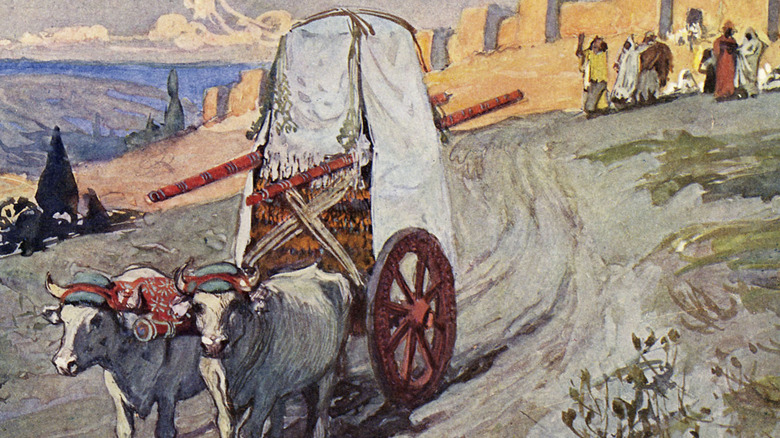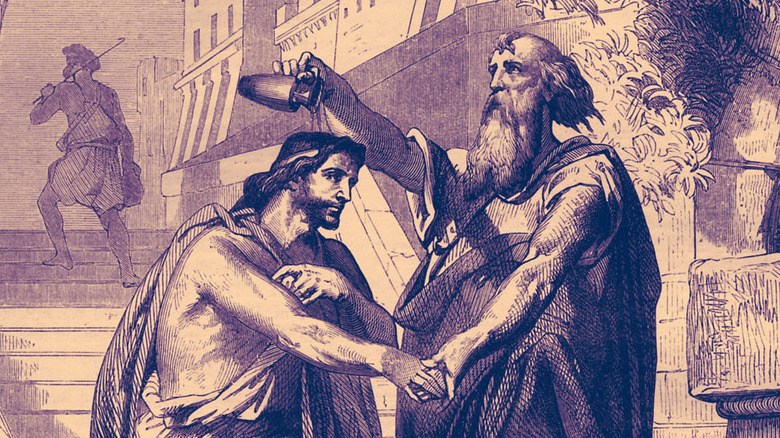Who Was Samuel In The Bible?
With the archetypal image of an Old Testament prophet being an aged man with a long beard leaning on a staff for support, it's sometimes easy to forget how active and dynamic they often became. Take Samuel, of the two eponymous Bible books. He anointed two kings, served as martial and religious leader to Israel, and even personally acted as an executioner to reinforce the word of God — not exactly the picture of grave, benevolent, and sedentary wisdom.
Before he was even born, Samuel was marked down for service to the Lord. In the first book of Samuel (via Bible Gateway), this decision is part of a promise his mother, Hannah, made so that she might finally have a son after many childless years. The name Samuel translates from Hebrew as "name of God" or "God has heard," according to Behind the Name. To fulfill Hannah's promise, Samuel became apprenticed to the priest Eli in the city of Shiloh as soon as he was weaned (for her devotion, Hannah was blessed with more children — three sons and two daughters).
Under Eli, Samuel became well-regarded by the people of Israel and by God, who chose the boy as his messenger for a rare vision. Unfortunately, that vision destroyed Eli and his house due to the wickedness of Eli's sons and his inability to restrain them. But Samuel delivered the prophecy, which Eli accepted, and from that time on the younger man's status as a prophet rose.
Samuel led the Israelites against the Philistines
Per 1 Samuel 4, the fall of the house of Eli also saw the Ark of the Covenant fall into enemy hands. In a war with the Philistines, Eli's sons were slain, the ark was taken. Eli himself died of grief after hearing the artifact was lost. Nevertheless, the Philistines didn't have much joy in their prize — God's hand struck wherever the ark was taken. Not only that, but defeat reignited the faith of the Israelites, who turned to God for guidance via his prophet: Samuel.
After directing his people to cast aside all false gods, Samuel assembled them at Mizpah so he could speak with the Lord on their behalf. This mass assembly attracted the notice of the Philistines, who moved to attack. But Samuel offered a lamb sacrifice and took up leadership of all Israel. God intervened with thunder, the Philistines' attack was routed, and the Israelites pursued and slayed them.
To commemorate the victory, Samuel set a stone at the border of Mizpah and named it Ebenezer ("stone of help"). He then retired to his home in Ramah, where he maintained an altar. But Israel still looked to him as a leader, and he regularly traveled throughout the region to offer advice and dispense judgment. The Talmud (via Sefaria) states that Samuel traveled with his household so that he would never be a burden to others while performing his responsibilities to them.
His stance toward an Israeli monarchy shifted
At the time Samuel rose to prominence, Israel had no king. According to the Jewish Virtual Library, the territory was instead governed by a series of judges chosen from the different national tribes, and each group retained a large measure of autonomy. Movements toward a monarchy had been rejected, sometimes by the judges themselves. "The Lord will rule over you," Gideon told Israel in Judges 8 (via Bible Gateway).
Samuel, at first, was of the same mind. He served as a well-respected judge himself, but when he passed that authority to his sons in his old age, they proved corrupt and ineffectual. Israel rejected the boys, turned to their father, and demanded of him a king. Samuel at first took their wish as a personal rejection but was advised by God that Israel had not spurred him, but God himself. Through Samuel, God warned his people that a king would, in time, become oppressive over them, but Israel still demanded a king. On God's command, Samuel found them one: Saul, of the tribe of Benjamin.
According to Britannica, biblical critics and historians have puzzled over the shift in Samuel's position on the monarchy. The extent of responsibilities Samuel himself had as a leader of Israel and his later clash with Saul are similarly confused. It's been proposed that Samuel reflected a group of young nationalist religious zealots torn between Israelite traditions and a need for a stronger central authority to address military and political woes.
Samuel rejected Saul three times
Saul, a man of humble birth and means, was chosen by God and anointed by Samuel as the first king of Israel in 1 Samuel 10. He had an inglorious reign — the Jewish Virtual Library asserts that his short-lived dynasty (only two years) never came into great wealth, and he was almost entirely concerned with war. Saul also quickly ran afoul of Samuel, who continued to warn against having a monarch rule in place of God, even after the new king's early victories. When Samuel was late arriving at a battlefield to offer a sacrifice, Saul performed the rite himself. For usurping the duties of a priest, Samuel gave his first rejection of the king.
The second rejection came from God through Samuel after Saul disregarded the Lord's command to utterly destroy the Amalekites and all their flocks, letting the king and "the best of the sheep and cattle" live (via Bible Gateway). Samuel rejected Saul's pleas for forgiveness and slew the king of the Amalekites himself before departing for Ramah, never again to see Saul. By God's guidance, Samuel found David in Bethlehem and anointed him as the new king of Israel. Later, when Saul came for David's life, Samuel gave the boy sanctuary.
Samuel's final rejection of Saul came after his death. Faced with another army of Philistines and abandoned by God, Saul turned to the witch of Endor to conjure the deceased prophet's spirit for advice. But Samuel's ghost had no comfort to give the king — only a third rejection on account of his past sins.



